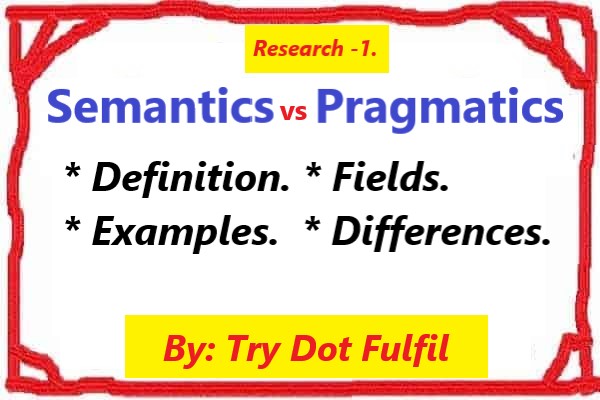Semantics vs Pragmatics, Difference between semantics and pragmatics, Semantics and pragmatics, Difference between pragmatics and semantics, semantics definition, pragmatics definition, semantics examples, pragmatics examples, Try.Fulfil
Semantics and pragmatics are the two basic levels of
linguistics. Both are related to the study of meaning in a language. Both have
some similarities and also dissimilarities. Let’s know broadly about semantics
vs pragmatics.
 |
| Difference between semantics and pragmatics. |
Semantics definition:
The basic level of
linguistics which deals with the study of meaning is called semantics. Semantics
defines how meaning is constructed by language. Moreover, semantics
includes how meaning is interpreted, illustrated, clarified, obscured,
contradicted and paraphrased. It’s used in language acquisition and language
change. Furthermore, semantics is highly theoretical in manner. Semantics
doesn’t include context in its study of meaning in a language. For example,
semantics investigates the meaning of words, phrases, sentences etc. but
not the use of it in real life situations.
Semantics Examples:
There are several
fields in semantics which studies meaning in different ways. Examples
of semantics can be added by naming several lexical relations for example
synonym, antonym, hyponym, homonym, homophone, ambiguity, polysemy, prototype,
acronym, abbreviation, metonym, collocation.
Pragmatics definition:
A branch of linguistics which studies language use in
context is known as pragmatics. It also deals with meaning which is not
transparent in normal explanation of words or sentences. It speaks beyond the
literal meaning of utterances. Pragmatics includes the meaning of
language in interaction and how we communicate and understand us. In short, pragmatics
studies how we use language in real life situations, for example, how we listen
and make utterances in context and maintain social relationships.
Pragmatics Examples:
There are different
issues in pragmatics, to give example, they are speech act theory, felicity
conditions, conversational implicature, cooperative principles, conversational
maxims, relevance, politeness and deixis.
Difference between semantics and pragmatics:
The differences between semantics and pragmatics can
be identified according to different phenomena, e.g. definition, context, focus,
scope, examples, significance of words etc.
In terms of definition, semantics is the theoretical
understanding of meaning. It studies the meanings of linguistics expressions. On
the contrary, pragmatics is the study of meaning in contextual situations. It
is related to the practical use of language. This is the sole difference
between semantics and pragmatics.
Secondly, semantics doesn’t consider context in
investigating meaning wherein pragmatics highly judges context in its study.
Furthermore, semantics focuses on the meaning of
words, phrases, clauses and sentences. On the other hand, pragmatics focuses on
language use.
In terms of scope, semantics is a narrow field as it
deals with only meanings of the utterances. But pragmatics is broader when is compared
to semantics as it holds aspects beyond texts.
Next to this, semantics discusses vocabulary, grammar and
conceptual meaning. Rather, pragmatics deals with the contextual factors of
language.
Example of semantics can be shown through this
sentence,
“My father has a
better smell than my father.”
This sentence provides a general meaning that I like my
mother more than my father. Then the meaning is understandable and acceptable
for all sorts of readers.
Example of pragmatics is manifested by this following
sentence,
“Will you crack open a window, please?"
If we take this literally, a friend asks to crack the window
means he is telling to damage it. But, in context or in pragmatics, we can
sense that he is asking to open the window a little.
---
Please comment below if this article is helptul to you.
Written by: Saiful Munna,
Honours in English, BD.



















2 Comments
Thanks a lot!
ReplyDeleteMost welcome Faiza.
Delete